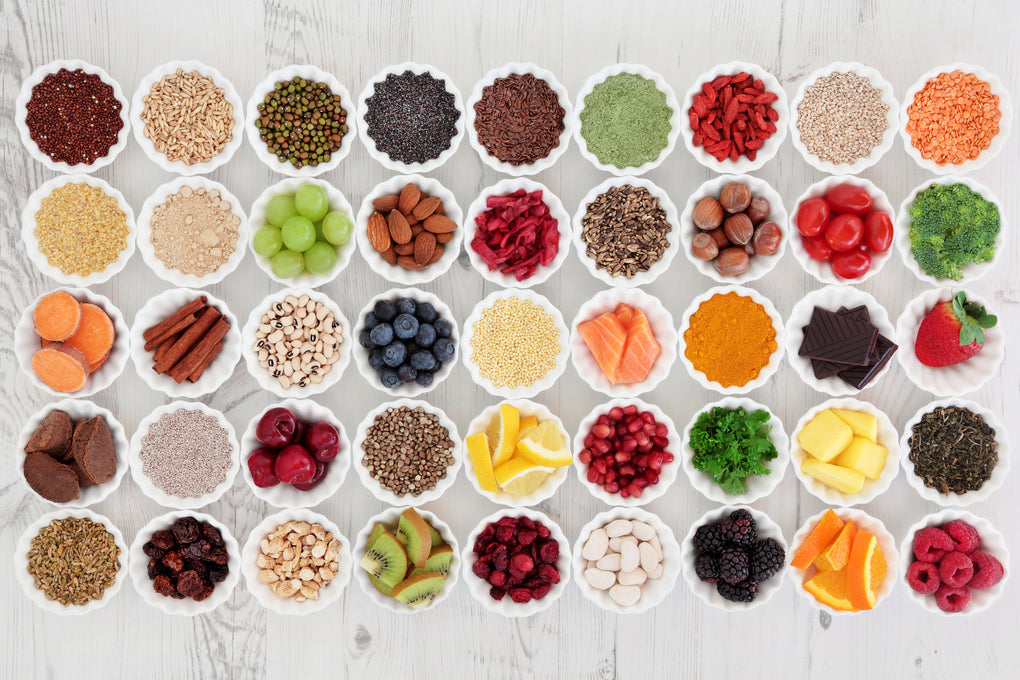What are Antioxidants and why are they important?
10th January 2019 / Health
What are Antioxidants and why are they important?
Zoe Milkowski

We hear about and see the term ‘antioxidants’ a lot; in the media, plastered over ‘superfood’ labels and even sometimes packaged in bottles sitting on the shelves of supplement shops and supermarkets. But what actually are they? What do they do and why do we need them? This blog post is designed to give a basic understanding of antioxidants and free radicals and their involvement in the body. It is not an extensively detailed scientific description of either of the two substances.
The aptly named ‘antioxidant’ can be defined as ‘a substance that inhibits oxidation’ and consequently prevents the production of ‘potentially damaging oxidising agents’ such as the infamous group of highly reactive, unstable molecules known as the free radicals.
So what exactly is a free radical and why does it cause harm?
In chemistry terms, a radical can be described as an atom, molecule or ion that carries an unpaired valence electron due to the original molecule either losing or gaining an electron. This unpaired electron makes the radical extremely reactive, unstable and have a very short half life. Electrons ‘like’ to be in pairs and so with an unpaired, unstable electron the free radical searches throughout the body to try and find a free electron to pair up with. This scavenging process causes all kinds of damage to the cells, proteins and even DNA in the body. Various diseases are associated with free radical damage including cancer, Alzheimer’s and Parkinson’s disease, all chronic inflammatory-associated conditions as well as free radicals potentially playing a major role in the ageing process.
Free radicals are, however, essential to life and maintaining a healthy body. They are produced naturally as the result of normal metabolic processes, like when your body converts oxygen into energy and produces free radicals as a by-product of this reaction. Free radicals are themselves also involved in the body’s energy-making process as well as playing a crucial part in the immune system and tackling infection. It seems to be the quantity and rate at which the free radicals are formed that may cause health issues.
There are various external, environmental sources that can expose you to free radicals and subsequent free radical damage. Radiation, pesticides, cigarette smoke and numerous other pollutants can cause free radical exposure and associated damage.
One of the proposed dangerous behaviours of free radicals is their formation and consequent chain reaction production. The first free radical formed scavenges an electron from the next molecule, destabilising the molecule and forming another free radical. This chain could continue until the whole cell is disrupted and modified causing irreversible damage. Some research suggests that free radical cell damage could lead to broken cell membranes, a change in the structure of a lipid or even mutated molecules that could turn malignant.
Oxidative stress occurs when the level of free radicals reaches a high point, enough to cause sufficient cellular damage - this is a level much higher than the level required to perform normal, healthy body processes. Free radical damage happens over time. For example, free radicals cause the connective tissue collagen to weaken, skin elasticity becomes reduced and over time (as we age) more wrinkles become visible on the skin.
How do antioxidants fit into this?
Simply put, antioxidants keep free radicals under control. Antioxidants, as their name suggests, prevent the oxidation reaction from happening meaning that they prevent free radicals from taking electrons and causing damage. Antioxidants are able to give an electron to the free radical without becoming destabilised themselves and preventing any further free radical electron chain reactions.
The human body actually produces antioxidants itself, but at low, insufficient levels - especially when unnatural, external sources of oxidation and free radicals are involved (eg. smoking, pollution and a highly calorific diet).
Beta-carotene (converted to vitamin A in the body), vitamin C and E are all examples of antioxidant vitamins. All three vitamins are found abundantly in various fruit and vegetables, especially the more colourful ones such as purple grapes and cabbage and orange and yellow citrus fruits. Vitamin C is in fact one of the best known natural antioxidant sources and is well known for its key role in the immune system.
Antioxidants can be introduced through your diet - they are present, even in small quantities, in nearly all fruits and vegetables especially:
- Berries
- Citrus fruits
- Nuts
- Legumes (peas, lentils, beans)
- Spices (cumin, turmeric, cinnamon)
- Tomatoes
Do Link Nutrition products contain antioxidants?
Yes. Our Food Based Vitamin C boost is a perfect source of natural, citrus fruit derived antioxidants that we recommend to everyone for an added immune system defence. All of our vitamin C-containing blends will offer some antioxidant benefits, however the Vitamin C boost has the highest concentration of vitamin C and therefore will offer the most antioxidant effects. Our Mushroom Plus is also a great source of antioxidants due to the four different adaptogenic mushrooms we have used in our blend. Chaga has the most antioxidant power of all four mushrooms used; Cordyceps, Reishi and Lion’s Mane.
From The Blog
-

25th February 2025 / Health
Empowering Women’s Health: Key Supplements for Well-being
Women’s health is a lifelong journey, with each stage presenting unique nutritional and wellness needs. From maintaining energy levels to supporting hormonal balance and bone health, the right comb...
Read article -

17th February 2025 / Health
Empowering Women’s Health: Lifestyle Tips and a Key Supplement for Perimenopause and Menopause
NaomiWomen’s health evolves through various life stages, and the transition into perimenopause and menopause brings unique challenges. During these phases, hormonal fluctuations can lead to symptom...
Read article -

10th February 2025 / Health / Products
The Best Foods and Drinks to Help Your Body Recover from Burnout
Burnout is a growing issue in today’s fast-paced work culture, leaving many people feeling exhausted, overwhelmed, and depleted. While rest and self-care are essential, nutrition plays a crucial ro...
Read article




